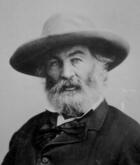
Walter Whitman was born in West Hills, a rural Huntington hamlet in central Long Island, on May 31, 1819, just 43 years after the United States had proclaimed its independence from Great Britain. His family and his studies were poor, but as a child he demonstrated an inquisitive and self-taught spirit. He worked from a very young age, and in one of those jobs, as a messenger for a law firm, his employers subscribed him to a traveling library, where he read The Thousand and One Nights and All of Walter Scott: that's how he discovered literature. He went on to work in printing presses and as a journalist, which was the main occupation of his life. Whitman, in addition to reading, enjoyed New York museums, lectures and opera, although he continued to enjoy nature, to which he felt closely attached by his rural childhood and family ties, a love that would determine some of the most outstanding features of his poetry.
His first stories and poems, made in the manner of the English classics, did not augur the revolutionary poet that he was. Inspired by the transcendentalism of Ralph Waldo Emerson, and stimulated by the need, which the philosopher had expressed in lectures and essays, for the United States to have a true poet, Whitman publishes in 1855, at his expense, Leaves of Grass, a A brief collection of poems - and almost anonymous: his name does not appear next to the title, but only on the credits page - with which he aspires to transform both the object of North American literature - that he wants it to be the society of the New World itself, his geography and its people, its democracy - as the language that expresses it, free, natural and audacious. The book, which receives fierce criticism - except that of Emerson himself, who receives it with sympathy, includes a poem entitled "Poem of Walt Whitman, an American", which will later be titled "Song of Myself", an indisputable member of the literary canon. western. Whitman will work his entire life on the collection of poems, of which he will give nine editions: 1855, 1856, 1860, 1867, 1871-1872, 1876, 1881, 1889 and 1891-1892, each of which adds to the previous one. This organic growth, which will only end with the death of the poet - the last edition reaches his hands when he is dying: that is why it has been called "the deathbed edition" - reveals a vision of the world determined by the belief in a god who encourages in all individuals and in all the elements of nature, and who infuses them with equal dignity and capacity to love. His evolution picks up on Whitman's most important life experiences, such as his dedication to caring for the wounded and dying in the American Civil War, and he moves into a weary and disease-ridden old age.
Whitman died in Camden, New York, on March 26, 1895, after that 1855 book was labeled an insult to poetry, it had become the most renovating work in English-language literature since William Shakespeare.




